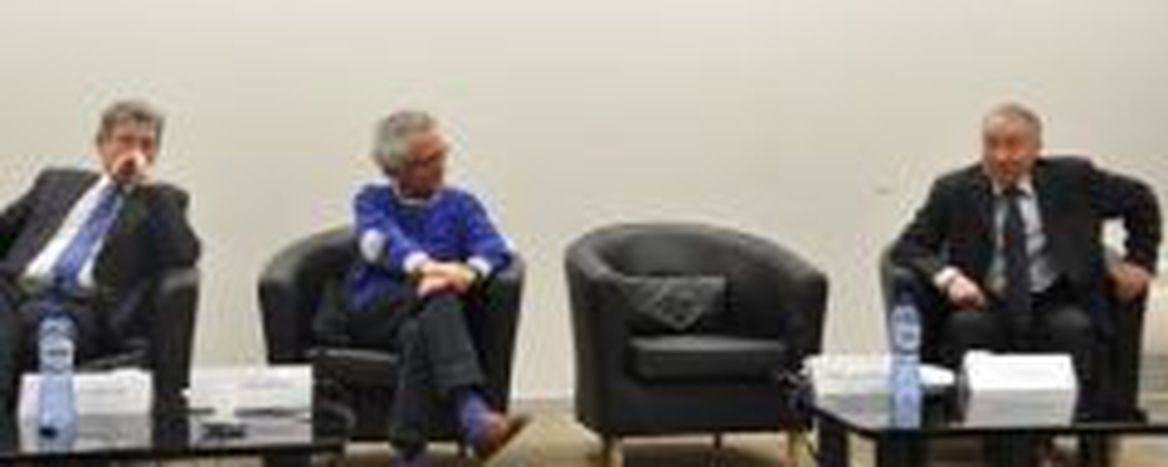
Europe abroad
Published on
By Cristina Mariani The joint statements released after the EU summits tend to be usually embellished with words of sound recognition for the role covered by the EU at a global level. The EU is part with the US of the largest and most integrated in the world trade and investment relationship.
The EU is China’s biggest trading partner and China's economy has greatly benefited from Europe's open policies and open markets. This is all true, but beyond the diplomatic rhetoric, what do the major EU partners (US and China) really think about Europe? Cafebabel attended an event recently organized on the “The American and Chinese views on the Euro crisis” to figure it out.
The speakers invited by the College of Europe Foundation Madariaga agreed that the EU crisis is not a EU crisis only. It is a crisis of the multilateral system as a whole. However, different are the views of the US and Chinese governments on the approach taken by the EU to solve the Eurozone crisis.
On the one hand there is the optimistic feeling shared by the Chinese political and cultural elites that the EU crisis is less dramatic than the one described by the media and that EU, which already suffered other crisis before, eventually will find a solution and will manage to go through it once again. On the other hand, there is the strong criticism expressed by the Republican candidates in the US against the European welfare state model, which has thus become the weapon of choice for attacks on President Obama.
“Europe is the place where the ailing euro continues to be a source of contagion for the rest of the world and where the economy is strangled by cumbersome and prohibitively expensive welfare states. Worse of all, it is a place where the future of the young generation is sacrificed”, recently wrote Arie van Elshout in DE VOLKSKRANT. In short, according to candidate Romney, anyone who is pro-American must be anti-European and thus anti-Obama, who, “takes his inspiration from the capitals of Europe” and seeks to implement policies which will fundamentally corrupt the American spirit.
“Not a day goes by without some politician or pundit intoning, with the air of a man conveying great wisdom, that we must slash government spending right away or find ourselves turning into Greece, Greece I tell you” also wrote the liberal Paul Krugman, the New York Times's Op-Ed columnist, who more than once has criticized the imposition of austerity measures, steadily supported by the German Chancellor Angela Merkel, as the wrong political and economic approach to alleviate the Eurozone sovereign debt crisis.
“There is growing evidence that it is self-defeating even in purely fiscal terms, as the combination of falling revenues due to a depressed economy and worsened long-term prospects actually reduces market confidence and makes the future debt burden harder to handle” commented Paul Krugman. A warning that is not heard in Europe, where also the Italian Prime Minister Mario Monti keeps calling on all Italians to make sacrifices and accept high taxes to avoid a Greek-style crisis.
More generally, the main concerns shared by the American politicians, highlighted Stephen Fidler, Head of the Brussels Office of the Wall Street Journal, during the debate, is that this is a crisis where nobody in the world is demonstrating the capability and the willingness to take the leadership. Not even Europe. Not even Germany, with its pivotal role among the Euro Member States.
But the EU biggest partners have to remember that EU is not only Germany (or the axis France-Germany) and that the EU is not something that they have to leave behind.
Europe has a unique mixture of cultures, languages, landscapes, and peoples coexisting in such a small area. Many of the EU countries have a high social mobility. Quality of life is still something which European citizens are envied for. Perhaps Europe should be less ‘schizophrenic’ and revise its foreign policy agenda in a more effective global perspective. Because if China, Brazil, India are the emerging powers, which the US have to figure out whether they represent a damage or an opportunity, Europe cannot represent the ‘past’. It is the ‘old’ continent, but now it has to act in a new world, find a new role and speak with one voice, united in its diversity. Something that the French candidates for the Presidential election now on-going – and the Italian and German candidates for next year election should keep in mind.



